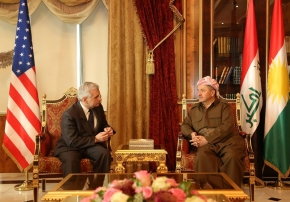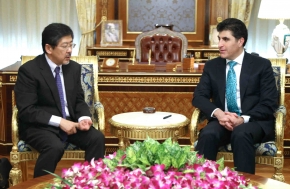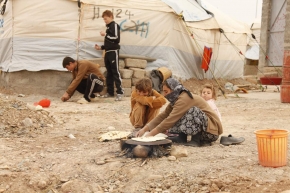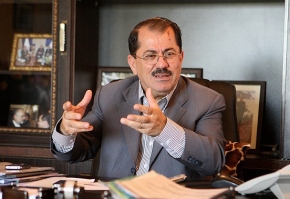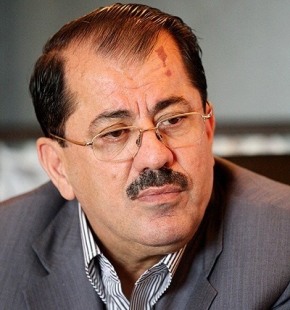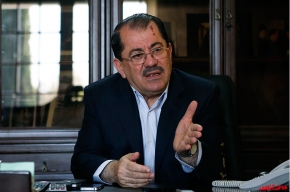Kurdistan Region President Masoud Barzani met with US Senator Jack Reed, ranking member of the Senate Armed Services Committee.
The President and the US Senator discussed the progress of the fight against ISIS terrorists, and US and coalition support for the peshmerga forces in this fight.
Senator Reed, who was accompanied by US Ambassador to Iraq Stuart Jones, praised the leadership of President Barzani and the bravery and sacrifices of the peshmerga forces in pushing back ISIS terrorists. He said the United States would continue to help the peshmerga forces in providing air support, training and with the provision of arms. He added that the people of the United States have deep appreciation for the sacrifices made by the people of Kurdistan in confronting ISIS terrorists and for their generosity in providing refuge many internally displaced people from other parts of Iraq.
President Barzani thanked the US senator and the American people for their support of Kurdistan. The President said that fighting the ISIS terrorists cannot be the responsibility of Kurdistan and the members of the international coalition alone; other countries, he said, must also step up their efforts. He said that other countries must help to stop the flow of ISIS fighters, and also to dry up their sources of funding.
Kurdistan Region President Masoud Barzani chaired a joint meeting of the leaders of Kurdistan Region’s five main political parties and the KRG oil and gas council, which included the KRG Prime Minister and Deputy Prime Minister as well as KRG Ministers of Natural Resources and Planning.
The meeting focused on the problems facing the Kurdistan Region, particularly the fight against ISIS terrorists, and the recently-signed Erbil-Baghdad deal on oil sales and budget share of the KRG.
At the outset of the meeting, President Barzani talked about the result of his meetings with world leaders during his participation at the Munich Security Conference earlier this month. He said the whole world views the Kurdistan Region and its peshmerga forces with great admiration for standing up to the ISIS terrorists and for taking in large numbers of IDPs from other parts of Iraq.
The participants of today’s meeting issued a statement in which they paid tribute to the bravery and sacrifices of the peshmerga. They also underlined the importance of preserving Kurdish unity in the face of the current challenges facing the Region.
On the deal between Erbil and Baghdad, their statement said, “The people of Kurdistan and the regional government consider it their legitimate right, per Iraqi Constitution Articles 112 and 115 and per the 2015 Iraqi budget law, to pursue exploration and export of oil from Kurdistan. Only this will fundamentally solve the budget and payroll issues facing the people of Kurdistan. The KRG remains committed to all sections of the deal signed between Erbil and Baghdad. Baghdad must equally be committed to all section of this deal. Any technical problems can be addressed through dialogue. ”
The meeting expressed its support of the KRG and expressed its hope that the KRG would be able to resolve the budget and payroll problems.
Erbil, Kurdistan Region, Iraq, (gov.krd) - Kurdistan Regional Government Prime Minister, Nechirvan Barzani, yesterday received the Japanese Ambassador to Iraq, Mr. Kazuya Nashida.
The Japanese Ambassador thanked the Kurdistan Regional Government for its stance and support following the murder of the Japanese citizen in Syria at the hands of the Islamic State terrorist organization, known as ISIS. He conveyed his condolences to the families of the Peshmerga forces who have been martyred in the fight against terrorism.
In another part of the meeting, Ambassador Nashida pointed out that, as part of Japan’s assistance to Iraq, his government will fund an infrastructural project related to the sewage system in Erbil city, which will be officially announced soon. He reaffirmed Japan’s commitment to continuing to help the Kurdistan Region.
The two sides discussed the latest developments in Iraq and the Kurdistan Region, particularly the situation in various battlefields. Prime Minister Barzani highlighted Kurdistan Region’s needs and requirements in its war against ISIS.
They also discussed the latest visit by a Kurdistan Regional Government delegation to Baghdad and the agreement reached last December between Baghdad and Erbil. Prime Minister Barzani told the Japanese Ambassador that Baghdad had officially informed the Kurdistan Region that the lack of liquidity in Iraq is the reason that Iraq is unable to send the Kurdistan Region its allocated share from the federal budget as was finalised in the agreement, last December.
The Prime Minister Barzani thanked the Japanese government for having funded several projects in the Kurdistan Region.
A displaced Kurdish Yezidi family in Khanki camp in Duhok Governorate.
Erbil, Kurdistan Region, Iraq, (gov.krd) - Iraq’s non-membership in the International Criminal Court hinders the efforts to internationally recognise the crimes committed by the Islamic State terrorist organization, ISIS, against the civilian population in Iraq and the Kurdistan Region, as genocide.
The Kurdistan Regional Government, KRG’s Minister of Martyrs and Anfal Affairs, Mahmoud Haji Salih, who is also the head of the KRG Committee on International Recognition of ISIS’s Crimes as Genocide, particularly those committed against religious and ethnic groups, reaffirmed this fact. He said, “So far Iraq is not ready to become member in ICC, therefore the legal procedures for the genocide recognition is passing through a difficult path”.
In an interview with KRG website, Minister Salih said, “The main condition for internationally trying the terrorist organization, ISIS, for genocide against Yazidi Kurds and other religious groups, is Iraq’s membership in the International Criminal Court. However, following our committee’s discussions with three Iraqi ambassadors in European countries, we got to the conclusion that Iraq is not ready to become member in ICC”.
He added that Baghdad’s stance on this issue “hinders even local efforts to set up relevant courts in Iraq or Kurdistan Region, since there is no article in the Iraqi laws that refer to genocide. The only solution is to convince the Iraqi government to treat this case individually and approve it with the International Criminal Court so that it investigates the case. For this, great deal of efforts needs to be exerted by the officials representing Kurdistan Region in the Federal Government in Baghdad”, Minister Salih told KRG website.
Following the capture of the city of Mosul and its surrounding areas in June last year, ISIS led mass-killing campaigns against the Yazidi Kurds and other religious groups living in those areas. The Ministry of Martyrs and Anfal Affairs established a centre in the city of Duhok in charge of investigating and collecting evidences of ISIS crimes. The centre has so far documented more than 300 cases, 65 of which are ready to be submitted to the International Criminal Court.
Minister Salih elaborated that the reason why Iraq is not eager to become a member at the International Criminal Court is because its membership entails great deal of responsibilities that Iraq may not be able to shoulder. He added that “if the current efforts did not succeed in recognizing the genocide against the victims of ISIS, then perhaps the UN Security Council can issue a resolution about it or a special tribunal to be established similar to the one established for Rwanda and the former Yugoslavia.”
He also said that the committee he heads plans to send a delegation to Baghdad to consult with the presidencies of the Republic, Parliament, Prime Minister, Foreign Ministry and Ministry of Justice to further discuss this issue.
Minister Salih also criticised those parties and individuals who have been trying, for political reasons, to separate Yazidis form Kurds, speculating that the Yazidis are not Kurds but a different ethnic group.
Shafaghna- Nazem Dabbagh the representative of KRG of Iraq in Iran frankly knows Nuri Maliki the present main problem of Iraq and believes that if today Mr. Maliki goes, tomorrow Shia, Kurds and Sunni will be unified in Iraq. Although severely criticizing Maliki for not being obedient to the mutual agreements with Kurds, he knows holding referendum a typical work and Kurds’ right while emphasizing that Kurds want no separation, but prefer a confederation government. He mentioned the Kurds’ cases under dispute with Iraq government of which one is the limits of the Region of Iraq already agreed according to the article 140 of the constitutes of Iraq, another is the case of oil that the region thinks it has not completely assigned to it.
He said that Maliki government formed Iraq army with exorbitant costs but employed Ba’ath officers. He added we told him again and again not to do it but he underestimated it. We observed these officers helped ISIS in their recent attacks and betrayed the army. He rejected the claim saying that Kurds helped ISIS in the attack to Sunni areas of Iraq specially Mosul. Dabbagh went on that for ISIS attack and its occupation of a great part of the country, nowadays Iraq is divided into three sessions of Kurds, Shia and Sunni so that the commuting path from the region to Shia areas turns to footpath. Also Shia of Iraq is insisting on to find a solution to the crisis of the country and believes if Mr. Nuri Maliki goes, the agreements among Iraq tribes will be reformed.
Shafaghna reporter in talk with Nazem Dabbagh the representative of KRG of Iraq in Iran put the reason of being powerful of ISIS in Iraq and the operation of KRG and Masoud Barzani’s recent phrases concerning the articale140 of the constitutes and Kurdistan region under discussion.
Dr. Zarif’s travel to Baghdad, Najaf and Kurdistan region of Iraq was for making continuation of the Iran and Iraq strategic relations. It is not the first time that the foreign minister has travelled to Iraq; but before the former foreign minister and vice-president of the Iran has travelled to the region and visited the authorities of KR.
Naturally I.R.Iran considers Iraq and KR as important allies having brotherly and friendly continuing. This is interpreted as an historical accompaniment according to common benefits and security. Iran accompanied more than ever at the time of tough fighting of Iraqi different groups against the current dictator and Ba’ath party and did not begrudge any attempt to help Shia, Sunni and Kurds.
Today that the danger of Takfiri and ISIS terrorist groups is felt more than before and the security of the region territorial integrity of some countries are aimed I.R of Iran’s help has increased and turned out to military aids. In this new situation that Kurdish pishmerga forces along with the Army and other Iraqi groups are fighting terrorists the type of communication matters double as much. In the yesterday common meeting of Mr. Barzani and Dr. Zarif, the president of the region emphasized that Iran has been one of those initial countries rushed to help the region in sensible conditions of the battle with ISIS and appreciated I.R of Iran due to the aids of this important country of the region in a special letter on the behalf of the president. The common historical and tribal benefits and ties between Iran and Kurdistan region of Iraq undoubtedly affect and will affect on the strength of present and following relations.
The point that should remembered here is that I insisted in my talks with Iranian and foreign Medias undoubtedly KRG knows itself to be commitment to sustain the territorial integrity and national security of Iraq therefore this is bilateral relation and it is expected that all official authorities and powers with focus on the constitutes get to be obedient to comprehensive collaboration of the region in different processes. The foreign minister of Iran also approved Iran’s support from the being carried out of the agreements between central government and KRG of Iraq yesterday.
Today that in national level changes have occurred among authorities it is expected by all groups that national management thought of Iraq will change. After Saddam’s fall Ayad Alavi, Ibrahim Jafari, Nuri Maliki and now Haydar AL-Ebadi have taken over the responsibility of the prime ministry thus going and coming in responsibilities is a natural work. Whatsoever upon this matter is important is the correction of wrong policies of political actors and strengthen the weaknesses. It has repeatedly been emphasized by experts that the emergence of the phenomena of ISIS Takfiri terrorism results from some discriminations and insularity to apply all national forces aside from tribe, race and religion in administrative responsibilities.
This matter even has caused some respected and honor moves of Shia have dissatisfied with the way of last government and other groups cooperation. Now we expect with new collaborations new thought will lead to conduct the constitution focusing on national unity and to from a comprehensive and organized government to prevent terrorism from rooting. Recently the meetings of Kurdistan representatives with Shia and the prime minister personally coalition has been held and we are optimistic to Iraq’s future. The constructive and effective role of Iran to make cohesion all Iraq’s groups undoubtedly lead to accelerate the reconstructive process of Iraq.
Nazem Dabbagh, the representative of Kurdistan Regional Government of Iraq in Iran, in a note deals with the emergence and growth of ISIS. In his view ISIS is generated through strategic competence between the east and west. When Marxism and Liberalism were competing the Soviet Union attack Afghanistan which caused Islamic groups form universal groups. In this atmosphere Osama Bin Laden appeared and Wahhabi groups came to power in Afghanistan. The peak of their power was the terrorist attack to twin global trade towers. As America attack Iraq the Ba’ath began to oppose new Iraq. Some of them headed Syria government and it also employed them in order to accomplish their goals.
Dabbagh believes that the wrong political management in Iraq caused till Ba’ath and Wahhabi groups have grown so that the weaknesses of the central government to give serves to Sunni regions brought up oppositions of the people for times. Through these opposition Salafists took more advantages than others and absorbed many groups.
In Syria employing individual policies and the actions of domestic opponents such as Ekhvanis and Salafis in Homs as well as Kurds whose its identity has not been taken for granted for many years, follows a wave of oppositions against Assad’s government. Following the occurred vacuum Takfiri groups took the most advantages and took more areas under their control. In these conditions Al-Qaeda of Iraq and former Ba’aths dispatched their supporters and concentrated their actions toward Syria and unified with the Arab opponents and put Kurds aside. After endless support for the Groups called opposition of Syria all these came to a great power in a way. Then it got clear that Salafi-takfiri separated from this frame and Syria free army began to weaken and the Al-Qaeda of Iraq and Ba’ath became more powerful and could take the control of the game field of Syria. After coming to power Salafis, Takfiris and a part of Syrian Ekhvan got unified and incorporated Islamic government of Iraq and Syria (ISIS).
ISIS plans is to incorporate Islamic government, to reject other ideas and ideologies and to announce others as infidel, to turn to terrorist actions and massacre the opponents. They advanced so fast that they could spread their actions to Iraq like Mosul, Tikrit and a part of Samarra, Kirkuk and Diyaleh and united many regions to Fallujah and Al-Anbar. The reason of their success was first the disability of Iraq army and Maleki who surely formed the army with the remains of Ba’ath. For this within a couple of hours nearly 100,000 Iraqi soldiers ran away and the region was under ISIS control but those regions protected by Pishmerga troops.
Of course based on history the union of Ba’aths, Al-Qaeda, Salafi and Takfiri can be referred to Islamism school which since the corporation Ba’ath believed the unification of Syria, Iraq and Egypt, and even now after many years as the condition being prepared they tend to form Islamic government and to survive Islamic caliphate accordance with their thought and plan.
ISIS is generated by who hated unified Iraq and powerful Kurds and Shia and thought of taking revenge; and at last began to attack and spread the borders under their control that I personally already in several interviews mentioned this that ISIS would attack Kurdistan and finally they did so.
Concerning Kubani events Etemad Press asked for Mr. Dabbagh’s view of which the most important parts as followed:
In the response to the question he answered: the confirmation of 40% occupation of Kubani by ISIS is under doubt. But he stated that presently by Kubanian people resisting against ISIS it seems it will be difficult to occupy this city. Although they have been surrounded by three sides, by such these little weapons they have been able to confront ISIS, if they have proper equipment they can set them back from Kubani.
Concerning the role of Turkey he said: that turkey will permit not any help to be given to Kubani. Despite of written request of the president of Kurdistan region this country has only settled its tanks on borders and it has done nothing special more. Dabbagh said: to give any help from Kurdistan Region to the Kurds of Syria is so difficult for loss of land communication. He added: Turkey is expected as a democrat country, a member of NATO and an Islamic country and in accordance with the human right …take an action toward ISIS.
Dabbagh already said that the airstrike of the coalition affect a little. If accompanied with these attacks Kurds are supported it can be workable. He said he does not expect foreign forces to enter the region. About the claim saying if Kurds access the advanced weapons may cause another crisis he considered it just as a pretext. In his view these equipment is just used to defend people of Kurd. Kurds want according to the constitution of the country in which the live begin to work.
Latest News
- President Erdoğan reaffirms Türkiye’s continued support for Iraq and the Kurdistan Region
- President Nechirvan Barzani’s message on the 126th anniversary of Kurdish journalism
- President Nechirvan Barzani at the Sulaimani Forum: The country must bring us all together
- President Nechirvan Barzani meets with European Union Ambassador
- President Nechirvan Barzani receives French Ambassador
- President Nechirvan Barzani visits Iranian Consulate General to pay respects to victims of Kerman terrorist attack
- President Nechirvan Barzani receives outgoing French Ambassador
- President Nechirvan Barzani condemns terrorist bombings in Iran
- President Nechirvan Barzani meets with US Deputy Secretary of State
- President Nechirvan Barzani’s New Year Address
- KRG Prime Minister Meets with US Deputy Secretary of State
- KRG Prime Minister Engages in Key Talks with UNAMI Chief
- KRG Prime Minister Hosts Diplomats from Iraq and Kurdistan Region
- KRG Prime Minister Meets with the UN’s Secretary-General at COP28
- President Nechirvan Barzani meets with Turkish Ambassador
- KRG Prime Minister Welcomes UK Military Delegation
- President Nechirvan Barzani meets with UK Chief of the Defense Staff’s Senior Middle East Advisor
- KRG Prime Minister Discusses Regional Issues and Domestic Policies in Special Panel
- KRG Prime Minister Meets with Former British Prime Minister
- MEPS Forum in Duhok Highlights Climate Change Among Key Global Challenges
- KRG Prime Minister Meets with United Nations Delegation
- President Nechirvan Barzani and French Ambassador discuss the situation in Iraq and the region
- President Nechirvan Barzani meets with Head of the Independent Strategic Review of UNAMI
- KRG Prime Minister Inaugurates 5th International Trade Fair for Industry and Construction
- KRG Prime Minister Meets Qatar's Consul General
- President Nechirvan Barzani meets with Iraq’s Oil Minister
- KRG Prime Minister Welcomes Cardinal Sako of the Chaldean Catholic Church
- KRG Prime Minister Meets with Iraq's Energy Officials
- KRG Prime Minister Meets with British Ambassador
- President Nechirvan Barzani meets with UK Ambassador to Iraq

